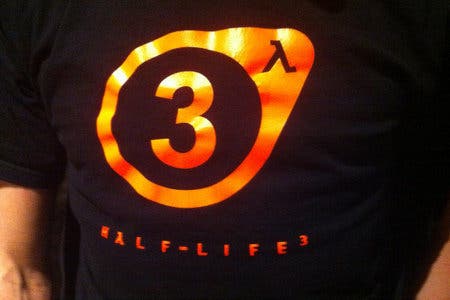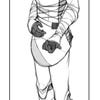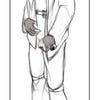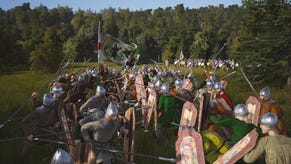Valve on Valve Time: "It's charming. It's kind of a compliment."
Plus, we ask, what's taking Half-Life 3 so long?
Valve Time - the term coined by fans to describe the seemingly endless development of the Half-Life maker's games.
But what does Valve itself think of Valve Time? Is it happy about it? Sad? And how did it become a thing?.
At the Develop conference in Brighton business development chief Jason Holtman told Eurogamer Valve loves the Valve Time tag - so much so that it values it.
"Valve Time is interesting," Holtman said. "To my mind, an interesting thing about being on the inside of Valve and working there quite a while is, what we're always concerned with is doing what's right for the customer; doing what's right for the product. And people get an idea of Valve Time because they're very used to how maybe other people work and bring things out. Other people have much more formalised schedules. They have dates they have like lines in the sand because of their structures.
"When we get up to that, we may fully say at an E3 or a GDC, here's a game coming out and here's when we think it is. And then it doesn't come out for a year. Or it doesn't come out in the fall, it comes out in the spring. Hence we get tagged with Valve Time.
"The reason for that is because it's odd. It's an oddity. In other cases what it means is people are usually slipping and it drives people nuts, because they're so used to being able to predict when that comes out. In our minds we say, that's not important. It's actually not super important if this thing comes out on the Christmas where we said it would come out last year and we thought that's when it was. What's actually more important is we build it right and it comes out in spring."
Holtman described Valve Time as "charming" and "kind of a compliment". "We like it," he continued.
"We also value it. If the end result is, we get tagged a little bit of like, we can't tell when you're coming out or you take longer, that's okay with us. Because we're trusting the fact that when it takes longer, it will be better. The thing that is ultimately consumed and played with, customers will like it better - like it better than the thing we could have shipped them a year ago.
"We would infinitely rather have happy customers for decades, rather than a happy batch of customers at one Christmas.
"We try as hard as we can to make the best thing possible in the right time frame and get people content they want to consume. And if that takes longer, that's fine."
What fans don't see, Holtman said, is that sometimes products or features take less time than Valve expected. "Sometimes we'll have a feature and it'll surprise us how quickly we can get something built and out to the community, or get an update out and out to the community.
"So there's no mandate or, we're just going to take longer, everything takes longer, like a fine wine mandate in the old commercials. I don't think that's what it is at all. What we're just saying is, we're going to do it when it's ready, and we're going to do it when we think you're going to like it, and we're going to do it when we think it's best.
"Hence Valve Time."
The concept of Valve Time applies most to Half-Life 3 (or, Half-Life 2: Episode 3, we're not sure at this point). It's been five long years since the release of Episode 2. A trilogy of episodes was promised some six years ago.
With nary a whiff of a status update on the future of the series in so long, comment threads and forums are littered with requests for the game. So much so, that you often see fans call for news on Half-life 3 in response to announcements for other Valve games or features.
Does it grind Valve down?
"It's a high compliment," Holtman said. "Having customers consistently looking at our property or something you've done and saying, can you give me more? Can you do that thing again? Every time we hear it we say thank you. I don't think it grinds us down at all. We're constantly saying, are you happy? Are we making the best things we can? Are we working with the best partners to bring you what you want?
"When people keep saying, yeah I want that too, that's how we hear it. We hear it as, that is people saying they want tickets to their favourite concert. They want to see that again. We hear it all the time. I don't think it grinds us down at all. I do think we take it as a very serious, very heartfelt compliment from folks. They're cheering for us. That's what that is."
So, what's taking so long?
"No. See now I'm being cagey."


















































